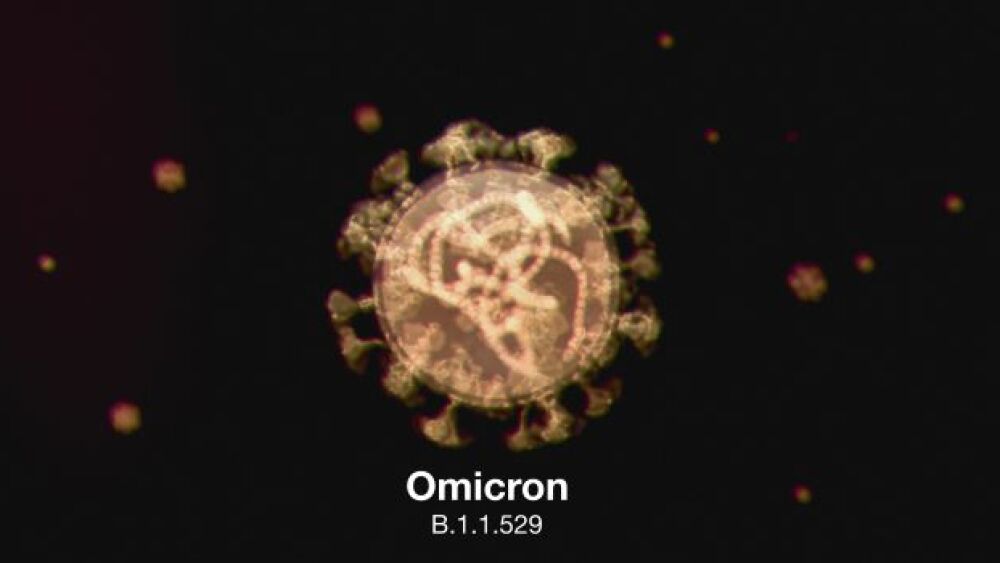Evidence continues to accumulate suggesting that Omicron, although significantly more infectious than previous COVID-19 strains, causes less severe disease.
Omicron continues to sweep across the world, but the good news is that it seems to cause less severe disease than previous strains of SARS-CoV-2, the virus that causes COVID-19. For that and more COVID-19 information, continue reading.
More Evidence Omicron Variant Associated with Milder Disease
Evidence continues to accumulate suggesting that the Omicron variant of COVID-19, although significantly more infectious than previous strains, causes less severe disease. This seems to be partly associated with fewer lower lung infections and more upper respiratory tract infections. The World Health Organization (WHO) said that this results in a “decoupling” between surging case numbers and lower rates of death in some locales.
“We are seeing more and more studies pointing out that Omicron is infecting the upper part of the body,” said WHO Incident Manager Abdi Mahamud. “Unlike other ones, the lungs who would be causing severe pneumonia. It can be good news, but we really require more studies to prove that.”
Evidence also shows that the COVID-19 vaccines provide some protection against the Omicron variant. Although the variant seems to evade some of the antibody response, the immune system has more weapons than just antibodies. The vaccines appear to elicit a T-cell response against Omicron.
“Our prediction is protection against severe hospitalization and death [from Omicron] will be maintained,” Mahamud said. He added that this also applied to vaccines developed by Sinopharm and Sinovac in China, where Omicron cases are still very low. “The challenge has not been the vaccine but the vaccination and reaching those vulnerable populations.”
Although Israel has begun dosing vulnerable populations with a fourth shot, in other words, a second booster, Mahamud notes that the best way to decrease the risk of Omicron would be to get 70% of the population in every country vaccinated by July instead of offering boosters in just some countries. He is also skeptical of vaccine manufacturers revising their vaccines to focus specifically on Omicron.
“You may go ahead with Omicron and put all your eggs in that basket and a new variant that is more transmissible or more immune-evasive may appear,” Mahamud said.
New Variant Emerging in France but Does Not Appear to be a Threat
About a dozen people in France have been diagnosed with a new variant of COVID-19, called the “IHU” variant by researchers at the Mediterranee Infection University Hospital Institute (IHU) in Marseille, France. The variant was first identified in November, about the same time as Omicron. The official designation is B.1.640.2, but it has not become a threat since first identified. It was first diagnosed in an individual returning to France after visiting Cameroon. It appears to have 46 mutations.
Dr. Tom Peacock, a virologist at Imperial College London, tweeted that IHU is “definitely not one worth worrying about too much at the moment.”
NRx Submitted EUA for Zyesami
Radnor, Pa.-based NRx Pharmaceuticals has submitted an application to the U.S. Food and Drug Administration (FDA) for Emergency Use Authorization (EUA) for Zyesami (aviptadil) in patients with critical COVID-19 who are at immediate risk of death from respiratory failure despite receiving approved therapies, including remdesivir, and who are ineligible for an ongoing ACTIV-3b NIH-sponsored clinical trial.
Zyesami is a synthetic form of Vasoactive Intestinal Polypeptide (VIP). It binds to the lungs’ air sac, or alveolus, the alveolar type II cell (ATII). There, it has demonstrated potent anti-inflammatory and anti-cytokine activity in animal models. The FDA declined an EUA for the drug in this patient population in 2021, but this new submission is for a narrower, proposed indication.
“We appreciate the detailed feedback and learnings from our previous EUA submission and applied them to this narrower request to the FDA,” said Dr. Jonathan Javitt, chairman and chief executive officer of NRx.
FDA Pauses Domestic Drug Inspections to Protect Staff Against Omicron
Just before the end of 2021, the FDA temporarily paused its “inspectional activities” to keep its staff and contractors safe from the spread of Omicron. They expect to continue the “mission-critical work” activities through January 19, 2022, but have postponed specific inspection duties. The FDA plans to continue mission-critical foreign inspections and “will reassess plans as needed based on its monitoring of foreign travel conditions.”
The FDA also decided to postpone planning for prioritized surveillance of foreign inspections that were expected to start in February. Instead, it will continue with the most pressing domestic inspections. State inspections that the FDA has contracted may continue under their discretion.





